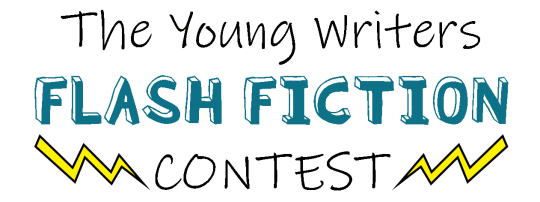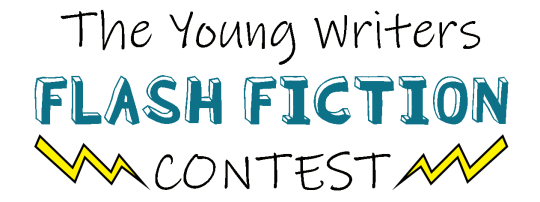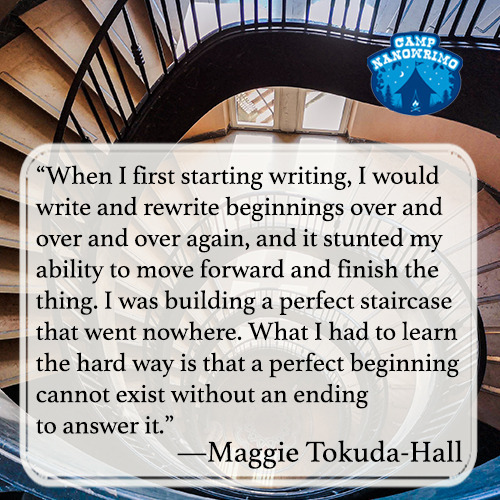Chris Baty's Blog, page 53
July 22, 2020
Worldbuilding Simplified

Whether you want to create a cyberpunk wasteland or an underwater dynasty, worldbuilding is many people’s favorite part of writing. It can also be be one of the most confusing parts of drafting a novel! Luckily Wrimo Melody Momper is here to save the day by sharing with us advice on creating a simple world building plan:
I’m going to give you the keyword for worldbuilding in two easy steps: Plantsing.
Stop! Don’t run!
Yes, I am talking to you, my dear Planners and Pantsers. I know you seem to live by a strict law of being one thing or the other, but you came here for answers, and I have them. The very thing that makes the two methods great and unique is going to be what saves you from the long painful process of worldbuilding.
So let’s get down to the nitty-gritty…
1. Have a general concept or idea of your world before you start writing.This part may come as a relief to our planners and perhaps a bit of a nightmare to our Pantsers. To that effect, I want to clarify that this part can be as detailed as little or as much as you want.
I want you to focus on what flashed into your head the moment you first came up with your story. What details did you attribute to it and what made you excited to write this story? Was it the setting, a character, a mythological background, or perhaps a festival?
Once you have identified all of these elements, I want you to take them and write them all down on a piece of paper. Let these concepts become the stepping stones of what your world is about to become. For a Planner, these are the elements you will look to as you outline and begin your first draft. For a Pantser, this is the list you have next to you as you write in a beautifully spontaneous freestyle.
Having an understanding of what made you want to write your story to begin with will come in handy as you go into the second step. It will also be your support when you start to doubt your work.
2. Write and develop detail as you go!Writing the details of your world tends to be where most writers find themselves spiraling into the pit of invented languages, detailed map sketches, ecosystem breakdowns, and history that spans the length of time. It is also the part where most writers start to feel overwhelmed with the need to get everything perfect.
If you are at this stage stop! Put down your pencil, take a deep breath, and resist falling deeper into madness.
I am going to tell you something that’s going to be very hard to hear. A large portion of your hard work will never enter your books. Yes, it is always good to have a grasp of the do’s and the don'ts of your world, but that can be figured out as you write.
You need to cut out the middleman and just start writing. This process will allow you to identify what is relevant to your story by acknowledging what your main character needs to know to interact with the world around them. In the end, the only parts that are going to matter to the reader are the parts that the main character interacts with. Figure out what these parts are, then figure out the details of how it functions in the world you created.
If you’re worried about losing track of information as you write, keep a key of names and definitions for you to reference back to. For a Planner, you may find yourself doing this twice, once as you outline and twice as you write your draft.
With all that said, I hope I have given at least some of you new insight and help when it comes to worldbuilding. Though worldbuilding can often be a long drawn out headache, it can also be simplified. So the next time you find yourself worrying about all the worldbuilding you need to do, please stop and consider the two steps above.

Melody Momper is a college student, blogger, photographer, and aspiring author. Her creations are inspired by her many travels around the USA and the world. She draws upon the rich cultures she has experienced to bring life to the writings and art she creates. Follow her journey on Instagram @MelMomperWrites.
Top photo by Adolfo Félix on Unsplash.
July 21, 2020
"When I’m feeling blocked, what I find to be helpful is the freedom that moving around offers...."
-
Leah Johnson is a writer, editor and eternal Midwesterner, currently moonlighting as a New Yorker. She is a 2021 Lambda Literary Emerging Writers Fellow whose work has been published in BuzzFeed, Autostraddle, Catapult, and Electric Literature, among others. Her bestselling debut YA novel, You Should See Me in a Crown, was named one of Cosmo‘s 15 Best Young Adult Books of 2020, and was an Indies Introduce and Junior Library Guild selection. Her sophomore novel, Rise to the Sun, is forthcoming from Scholastic in 2021.
Your Camp Care Package is brought to you by Camp NaNoWriMo. Sign up to receive more Camp Care Packages at nanowrimo.org!
July 20, 2020
3 Tips for Writing the Opening Paragraph of Your Novel

Whether you’ve spent far too long starting at a blank document not knowing how to start, or just skipped writing an opening entirely, trust us when we say we’ve all been there. That first page is hard! Which is why we have Wrimo Anusuya Mukherjee with us to share her top three tips on how to write a great opening for your novel:
Writing the opening of a piece of writing, for a short story or even a novel, can be a challenge. It is the first impression that your story gives to its reader. The question that I ask myself when i start writing my story is, “How do I get my reader interested?” These are the tips I use when I sit down to write:
1. Engage the 5 sensesWhen I start to write, I visualize the scenario in which the story is going to start. For example:
On a sticky August evening two weeks before her due date, Ashima Ganguli stands in the kitchen of a Central Square apartment, combining Rice Krispies and Planters peanuts and chopped red onion in a bowl. She adds salt, lemon juice, thin slices of green chili pepper, wishing there were mustard oil to pour into the mix. Ashima has been consuming this concoction throughout her pregnancy, a humble approximation of the snack sold for pennies on Calcutta sidewalks and on railway platforms throughout India, spilling from newspaper cones.
—The Namesake, Jhumpa Lahiri
When you start reading this passage, you immediately visualize the character, where she is, and how she is feeling at that moment. It engages your senses. If I close my eyes I can visualize the character and it immediately gets me interested about what’s going to happen next.
2. Character introductionYou don’t have to immediately start with how the character looks; maybe start with where the character is, what they might be feeling. For example:
“Finally I get to take the week off!” Becca thought. There had been an intense amount of work at the office and she was happy to get the rest of the week off. She had been working towards getting some days off and doing overtime so she could take this road trip. She was going to meet up with her old friends from her intern days. All of them had struggled to be at the positions that they were today and sort of had lost touch with each other.
From this we realize the character is a workaholic, but she has friends. This makes you interested about what the character is interested in and you want to know more about her. I normally depend on character intros for my stories as i feel more connected to the reader that way.
3. Set the SceneMake sure your reader is able to visualize the scene, what can they smell, see? What stands out to them? For example:
She sat at the window sill, waiting. It was the dead of night, and the humans were going out, as they called it, ‘trick or treating’ because it was Halloween. The moon shone from above and she was ready. It had been a long time since she had hunted and she felt breathless. Her grey eyes looked down to the ground.
You can imagine where the character is. What state she may be in and how the scene looks. You can picture the scenario in front of you.
So take it as a challenge: your first paragraph doesn’t have to be perfect, but if it’s able to get the reader interested, they’ll be eager to read further. Therefore, if you are able to engage the senses, give a killer introduction of the character you want the reader to focus on, and set the scene so the reader is able to picture it, you’ve already done half the work. Always remember to get yourself engaged in the writing, and the reader will automatically feel engaged too.

Anusuya Mukherjee was born in India, but was raised around the world. She has been writing for the past eleven years and has published her work in a few magazines and websites. She has graduated from law school and is currently in Kuwait. She hopes to someday be able to publish her short stories and poetry. You can follow her on Tumblr and Instagram, or check out her past work.
July 17, 2020
Read the YWP Flash Fiction Contest Official Runners-Up!

In May, we challenged our young writers to submit a 300 word flash fiction story containing the words “spider”, “rainbow”, and “cake”. From over 1,100 stupendous entries, we chose two Grand Prize Winners and three Runners-Up. We hope you enjoy reading them as much as we did!
The air was warm and damp on Maren’s face as she leaned against a tree, laughing to herself as she held a thick slice of cake up to her mouth. Mum would be furious with her.
The cake was for the Governor, when he visited today. Maren knew it was of the utmost importance—Mum had told her the visit could even end the war! And if the war ended, Dad would come home—something Maren had been longing for.
But Maren hated being told what to do…
“The Same Coin” by Salma S.She perched in the eaves, ready to rappel down with her knife at a moment’s notice. Dressed all in black, she would look to anyone below like a spider waiting to prey.
The rainbow hues of their jeweled gowns made her angry. How many mouths they could feed by selling that fabric!
They stood stuffing their faces with birthday cake and champagne, while her stomach growled. She had snuck her porridge into her grandmother’s bowl. That was yesterday night, the last time they had eaten…
“The Day My Birthday Went Bad” by Lily B.“Happy birthday Luna!” Mother said to me. I looked at the cake she was carrying. At first, I didn’t notice it. But then I looked at it. I screamed in terror. There on my giant, rainbow cake was a huge, very long legged hairy SPIDER looking at me with all of it’s big scary 8 different colored eyes. I ran for the garage. Mother dropped the cake.
The entire house had gone mad, screaming and running. Through the chaos, I searched for Spider, wanting to destroy it. I had picked up my father’s old metal baseball bat from the garage.
“DIE YOU HORRIFIC HIDEOUS HAIRY SPIDER!!!!!!” I screamed as I charged towards the nasty, gnarled, disgusting thing…
3 Steps for How to Find Time in Your Schedule for Writing

Sometimes we can have all the creativity in the world but feels as if there’s no free time for us to get our ideas down on paper. You may be finding that you have less time to write than you thought this month, but never fear! Novelist Sagan Morrow is here to help us get a writing schedule ready to go:
Just because you want to write a book, doesn’t mean it’s easy to find the time to actually do it! We all have busy, hectic lives… so, how can you carve out time in your schedule for writing?
As a productivity strategist and romance novelist, I get this question a lot from my clients and aspiring authors. It comes down to learning how to stay disciplined, and also putting together strategies that are the right fit for your unique situation and writing style.
Here are three actionable steps (plus corresponding pro tips!) you can implement today to find time in your schedule for writing.
1. Create a plan of action.Look at your upcoming schedule for the next few weeks and/or months. What non-negotiables have you already scheduled? What tasks can you shift around, to make more room for writing? Make a note of which days you’ll spend writing, and set deadlines for yourself in terms of when you’ll complete each draft.
If you don’t know your writing pace, try using a time-tracking software like Toggl to track where your time goes and calculate roughly how long it takes you to write 500 or 1,000 words. That will give you a more accurate idea when setting your timelines.
Not sure what this plan of action could look like for you? Here’s an example of a step-by-step process I used to write my first romance novel in less than two months.
Tip: Be honest and patient with yourself! Everyone writes at a different pace, so honour what that looks like for you.
2. Build habits and routines.Now that you’ve chosen which days you’ll work on writing your book, you can also take a look at what time of day you’ll write. Block that time off in your schedule.
Building habits and routines around your writing time can also help “prime” you for it: for example, if you have a particular playlist you always listen to, or if you know that your writing time comes after you’ve made coffee and done yoga first thing in the morning, then the habit and routine of it will make it that much easier to get into writing mode on a regular basis.
Tip: Ground this in energy management. When you identify your most creative times of day, you can use that time to your advantage! You’ll write faster and produce higher-quality work when you write according to your energy and creativity levels.
3. Document your progress.Motivate yourself by documenting the progress you make! I like using a word count tracker spreadsheet to organize this. This is a great way to stay on track with your writing goals, and to keep yourself accountable and inspired to keep moving forward.
Tip: Make your writing goals manageable. Rather than trying to write 2,000 words every day, aim for 400 words, for example, or set a timer to write for 15 minutes. Every bit counts!
Get more time management tips—and learn how to save 10 hours each and every week—when you grab my time-saving tips cheatsheet at SaganMorrow.com/savetime.
Happy writing!

Sagan Morrow is a romance novelist and shares about her writing journey in the Indie Author Weekly podcast.
When she isn’t writing romantic comedies in her Polyamorous Passions series, Sagan teaches online courses at SaganMorrow.com to empower other solopreneurs as they grow their own successful businesses. She specializes in productivity and time management for multi-passionate creatives.
Learn more & connect with Sagan:
Indie Author Weekly podcast Sagan’s business books & romance novels @Saganlives on Twitter & Instagram
Top photo by RODOLFO BARRETO on Unsplash
July 16, 2020
Camp Pep: Put The World in Your Novel

When our environments are filled with unrest and injustice, it can affect the way we write. Rather than wait for a more cheerful writing inspiration to motivate us, Young Writers Program participant Emma believes we should embrace these negative or even scary moments in life and use them in our writing:
There’s a lot going on right now, and it effects countless people. And sometimes, the only way out of our world is into our new world; the world of books and writing. But what if we add our world into our books?
How can we get inspired for Camp projects and other stories? By using the world around us. Here is an example: One day, I was on a bus, and it slid on the ice. We were okay, but it got me thinking, which turned into the idea for a story about a girl who was in an accident.
That’s an example of a possibility, but (and this is a very big but) how can we add what’s happening in our lives, in our current world, into our story? Not something that didn’t happen, or could happen (like a meteor destroying the Earth), but more like what is happening NOW as you read this.
No, I don’t mean right now like, your annoying little sister/brother is trying to see what you’re doing. I mean the hardships and things that are going on around us. Like illnesses, strikes, and inequality. We can use those to inspire us into writing a bigger, better story.
You can use the small stuff, too like a closing of your favorite store or getting a new book or trying a new food. Even seeing a butterfly. Though, yes, these are not enough of a topic for a WHOLE novel, but they are good for chapter ideas, or something that happens to keep the characters to make them seem more realistic and more relatable.
You can also include real traits from people that you know or have observed in your characters to make them seem more human and real. This doesn’t mean that your novel has to be nonfiction. Your novel can be science fiction, fantasy, or even literature. Just add some nonfictional flair to keep your reader interested. You can add historical events, or even present events.
If you’re not sure how to start or continue a writing project you’re working on, let’s brainstorm some things that are going on in our world right now that we can add into our stories:
You can channel your experience of quarantine. Your character could be exposed to a sickness by a family member or a friend. Your characters can go through an isolation and cannot see other characters. Your characters can learn something YOU did during this experience. (For me, it was chess and Greek.) You can add anything that you think is good, even something as small as a TV show you started watching.You can add movements and uprisings against inequality or injustice in your novel. Maybe your character finds themselves in a place where they don’t feel safe, and they have to figure out how to get out of that situation. Perhaps your character has a belief and makes a petition to fight an unjust law. Maybe your character is standing up for something that they have a strong moral belief in.What else is happening that you can add in your novel? Small things are helpful, too, as I mentioned. If you’re feeling stuck, you can always brainstorm your ideas and plan out your novel.
So get out your pens and pencils, and start brainstorming!

Emma has been writing since she was a kid. She enjoys singing, dancing, reading, writing, and drawing. She has written many drafts for novels and she hopes to finish a novel someday.
Top photo by Fernando @cferdo on Unsplash.
July 15, 2020
Read the YWP Flash Fiction Contest Grand Prize Winner (14-18 Age Group)!

In May, we challenged our young writers to submit a 300 word flash fiction story containing the words “spider”, “rainbow”, and “cake”. From over 1,100 stupendous entries, we chose two Grand Prize Winners and three Runners-Up. We hope you enjoy reading them as much as we did!
Charlie Hargreeves was a spider. That’s what the cops called the most powerful man in the city’s web of criminals. He masterminded bank heists, blackmail, and more. He was the best con man of all the scum of the city.
And now he was sitting casually in a café with an undercover cop.
John needed more information on Hargreeves’ activities. He had communicated with Hargreeves for weeks already. Today, the spider finally agreed to meet with him face-to-face.
“What brings you here, Sammy?” Hargreeves asked. John was supposed to be Sammy, a young lowly pickpocket.
“I want to be your pupil. I want to improve my skills.” John answered, watching Hargreeves’ brow furrow.
“Hmm,” Hargreeves huffed without a trace of emotion. “Becoming a top thief requires very difficult training. You may be so focused on the pot of gold at the end of the rainbow that you forget you’ll need to battle a storm to get there.”
“I’ll fight as many storms as I need to! Train me to succeed like you, sir.”
Hargreeves remained deafeningly silent, searching John’s eyes for their intent. John didn’t even dare breathe.
“Alright, Sammy.” Hargreeves finally declared. “I’ll be your mentor. Time to celebrate!”
To John’s surprise, Hargreeves ordered two slices of cake. They ate in relaxed silence.
“Pity,” muttered Hargreeves after John finished, “I should’ve taught you the first lesson of your training sooner.”
“Pardon?” John asked.
“Your first lesson,” Hargreeves chuckled, “is to hide your recording device better. I see the lump in your shirt pocket.”
John’s mouth turned dry, his skin immediately prickling with alarm. He was compromised!
His face began to burn. Then his throat. Then everywhere…
“Oh, and here’s another lesson for your training today,” Hargreeves grinned as John crumpled. “Always check for poison before eating your cake.”
Special guest judge Amy Spalding said this about “Difficult Training”: “I loved how this story managed deliberate pacing in such a short amount of time. The twist of the ending delighted me.”

Jackie C. is a rising high school junior who loves to doodle or attempt to bake new recipes in her spare time. However, her number-one favorite way of spending free time is with a good book in her hands. Her favorite genres are spy fiction and techno-thriller. She also enjoys studying Latin and Ancient Greek and exploring stories of mythology from ancient civilizations. Jackie hopes to publish her written work in the future. A fun fact is that she has always loved graphic novels as much as regular novels, and she dreams of creating and publishing both kinds someday!
“When I first starting writing, I would write and rewrite...

“When I first starting writing, I would write and rewrite beginnings over and over and over again, and it stunted my ability to move forward and finish the thing. I was building a perfect staircase that went nowhere. What I had to learn the hard way is that a perfect beginning cannot exist without an ending to answer it.”
—Maggie Tokuda-Hall has an MFA in creative writing from USF, and a strong cake-decorating game. She is the author of the 2017 Parent’s Choice Gold Medal winning picture book, Also an Octopus, illustrated by Benji Davies. The Mermaid, the Witch, and the Sea is her debut young adult novel, which is due out on May 5th, 2020 from Candlewick Press. She lives in Oakland, California with her husband, son, and dog.
Your Camp Care Package is brought to you by Camp NaNoWriMo. Sign up to receive more Camp Care Packages at nanowrimo.org!
Background quote photo by tangi bertin on Unsplash.
July 14, 2020
"The first book I sold was a picture book, and so for years after that I was like, ‘Well, I..."
-
Maggie Tokuda-Hall has an MFA in creative writing from USF, and a strong cake-decorating game. She is the author of the 2017 Parent’s Choice Gold Medal winning picture book, Also an Octopus, illustrated by Benji Davies. The Mermaid, the Witch, and the Sea is her debut young adult novel, which is due out on May 5th, 2020 from Candlewick Press. She lives in Oakland, California with her husband, son, and dog.
Your Camp Care Package is brought to you by Camp NaNoWriMo. Sign up to receive more Camp Care Packages at nanowrimo.org!
How Research Can Take Your Writing From Good to Great

Every year, we’re lucky to have great sponsors for our nonprofit events.Today, screenwriter Peter Malone Elliott of Book Pipeline shares how great research can lead to great writing. Book Pipeline is a Camp NaNoWriMo 2020 sponsor.
From an early age, there was never a shred of doubt in my mind: I wanted to be writer. I wanted to inspire change, uplift hearts and minds, and facilitate cultural and societal dialogue through my words.
At the end of the day, however, I learned the ins and outs of the craft (and what it really takes to be a working, professional writer) from the esteemed New York Times best-selling novelist, L.M. Elliott—my mother.
There are a thousand things I gleaned from a childhood of looking over my mother’s shoulder—way too many to fit into one blog post. However, probably the most valuable thing she imparted (besides exposing me to a plethora of classic literature and authors as soon I was able to read) is this: the only way to craft a truly authentic work is through intensive research.
As primarily a historical fiction novelist, my mother absolutely immerses herself into meticulously “doing her homework” in whatever time period her novel is set. This usually means reading at least a dozen nonfiction books and combing through hundreds of primary sources. This wonderfully hard-nosed commitment to accuracy undoubtedly comes from her background as a journalist (she was an award-winning reporter for 20 years before writing her first novel).
And all of this reading and research? She does it before she even writes a word. That singular dedication—in combination with her beautiful prose writing and character work—is what makes her books so powerful and potent.
Furthermore? I learned that it is the difference between great writing and good writing.I’ve taken this lesson to heart for my own career. In every single piece I write—whether a present-day crime thriller feature screenplay, a period drama TV pilot, or an adaptation of a novel or piece of nonfiction—I learn everything I possibly can about the world/setting of my fictional story before I begin typing. Going the extra mile in that way—and channeling my mother’s work ethic—brings revealing detail and voice that make my scripts stand out to producers, executives, and studios. For example, my feature screenplay about the 1963 kidnapping of Frank Sinatra Jr. is now being packaged by one of the biggest talent agencies in the world and read by actors and directors I’ve wanted to work with my whole life.
It is also a lesson that holds great importance for me in my job with Book Pipeline, the literary division of Pipeline Media. Since late 2019, I have spearheaded the expansion of Book Pipeline as their Development Executive. Through our Unpublished competition, we are dedicated to discovering emerging authors and connecting them with our network of literary agents and publishers.
It brings me such joy when I read a manuscript from an entrant who has clearly “done their homework”—when their prose is genuine and heartfelt, their characters and dialogue really pop, and their settings/backdrops are rich and fleshed out. It is truly an honor and privilege to “talk shop” with these authors—people who have poured their hearts and souls into their words in the pursuit of greatness.
Simply put? It is the best part of my day. Nothing is more enthralling and awe-inspiring—and I hope to have many, many more days like that in the future.
For more information on Book Pipeline, please visit their website.
Peter Malone Elliott is an award-winning screenwriter, producer, and playwright originally hailing from Virginia. After being selected as the winner of the 2018 Script Pipeline Screenwriting Competition, Peter joined the ranks of Pipeline Media Group one year later as their Development Executive. His first feature film credit as writer-producer was on the thriller Wired Shut (2020).
Top photo by Hans-Peter Gauster on Unsplash.
Chris Baty's Blog
- Chris Baty's profile
- 63 followers



